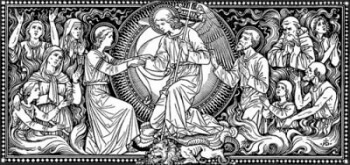 Both of the readings for Mass today mention prisoners. Saint Paul began his letter to the Ephesians by addressing himself as a prisoner for the Lord. Then Jesus discusses a magistrate, judge, constable and being thrown in prison. The common ground for both of these readings are about prisons, but what are the differences between the two?
Both of the readings for Mass today mention prisoners. Saint Paul began his letter to the Ephesians by addressing himself as a prisoner for the Lord. Then Jesus discusses a magistrate, judge, constable and being thrown in prison. The common ground for both of these readings are about prisons, but what are the differences between the two?
Saint Paul was at peace in prison, because he didn’t do anything wrong. He was in prison because he was spreading the good news about Jesus’s death for the forgiveness of our sins, and his resurrection from the dead. Saint Paul was wrongfully put in prison, but he was still at peace about it, because he had not sinned against the Lord. On the contrary, his words speak only of love, unity and peace with the Lord Jesus, God the Father, and all of God’s children:
“I, a prisoner for the Lord, urge you to live in a manner worthy of the call you have received, with all humility and gentleness, with patience, bearing with one another through love, striving to preserve the unity of the spirit through the bond of peace …”
Don’t these words sound like the exact opposite from the gospel reading today? The gospel said:
“Why do you not judge for yourselves what is right? If you are to go with your opponent before a magistrate, make an effort to settle the matter on the way; otherwise your opponent will turn you over to the judge, and the judge hand you over to the constable, and the constable throw you into prison … “
Saint Paul spoke of unity and peace, while Jesus spoke to the crowd about conflicts and disunity. He warned people that it was better to settle the matter between themselves, rather than let the judge settle it for them. It would be much easier and less painful if they would work things out between them, outside of court.
If you go on to read the last verse in the gospel, it says:
“I say to you, you will not be released until you have paid the last penny.”
This verse is the basis for the Catholic belief in purgatory. It makes sense if you think about it. When we die with a grudge against another person, or if we wronged them and never made restitution for it during our lives, then we will have to work through this unresolved situation in purgatory. Perhaps Jesus is trying to warn us that it is more painful to have to deal with unresolved conflicts and disagreements after we die, than it is to work through them while we are still alive.
The gospel is a good warning for us, because the book of Revelation says that nothing unclean shall enter heaven, and we can not enter heaven with bitterness in our hearts. Our hearts need to resemble Saint Paul’s description in the first reading for Mass when we die, and until it does, we won’t be invited to enter heaven. So, we really should work hard to resolve conflicts and problems and not put them off. Problems have to be worked through before genuine peace can flourish in our hearts.
Jesus said that when we look at the signs in nature and can predict the future weather, then why we can’t we see the signs in our life, of what we will face when we die with unresolved conflicts, grudges or unforgiveness in our hearts? We either settle these things now, or settle them later when we die, but it’s easier to work through our problems with other people while we are still alive.
There is a bit of good news though, when you think about purgatory. Many of us know people who have committed suicide, or a serious sin, and we worry over the eternal fate of their soul. No one can say for sure, the fate of a person’s soul, but purgatory is an indication that all is not lost. God’s mercy is greater than His justice, because it is possible to be released from purgatory and be admitted into heaven one day. People often commit suicide or a serious sin, because of psychological reasons or mental illness. God takes all things into consideration. Depression or other forms of mental illness or psychological problems can lessen the culpability of a person’s sin, in His eyes.
God is much more compassionate than we can ever begin to understand. He really does know us better than anyone else in life. He was there from the beginning and will be there at the end of our lives as well. He knows everything, even the things about ourselves that are hidden from our own consciousness. No one should ever despair of His love for them, or for anyone else they know and love. If we love a person that has passed, God does too, only in a much greater depth than we do.
When most of us reach purgatory, we can rejoice, knowing that we will be in heaven soon with the Lord. Our soul will simply be made beautiful there, and when we emerge, we will be free of all that weighs us down. It will all be left behind and only the beauty of the true nature of our souls will remain. Then, we will have no shame to stand before God’s holy throne. We will rejoice that we finally made it there – and so will He.
Daily Mass Readings:
Ephesians 4: 1-6 / Psalm 24 / Luke 12: 54-59
